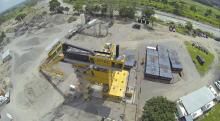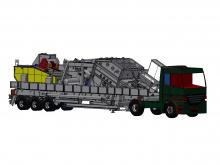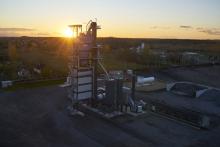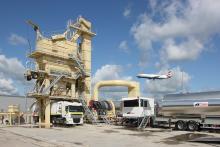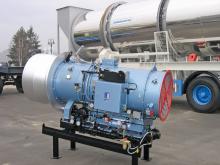In 2012 Benninghoven were commissioned by Kostmann, an Austria-based consortium of companies involved in the production and refinement of raw materials, to build an asphalt mixing plant that included a stone tower silo system. The plant - TBA-3000-U –was to be sited at Weitendorf, a location offering good access to the motorway, the Styria regional capital, Graz, and the Austria-Slovenia border. However, the close proximity of agricultural land and private residential areas called for an adherence to strict
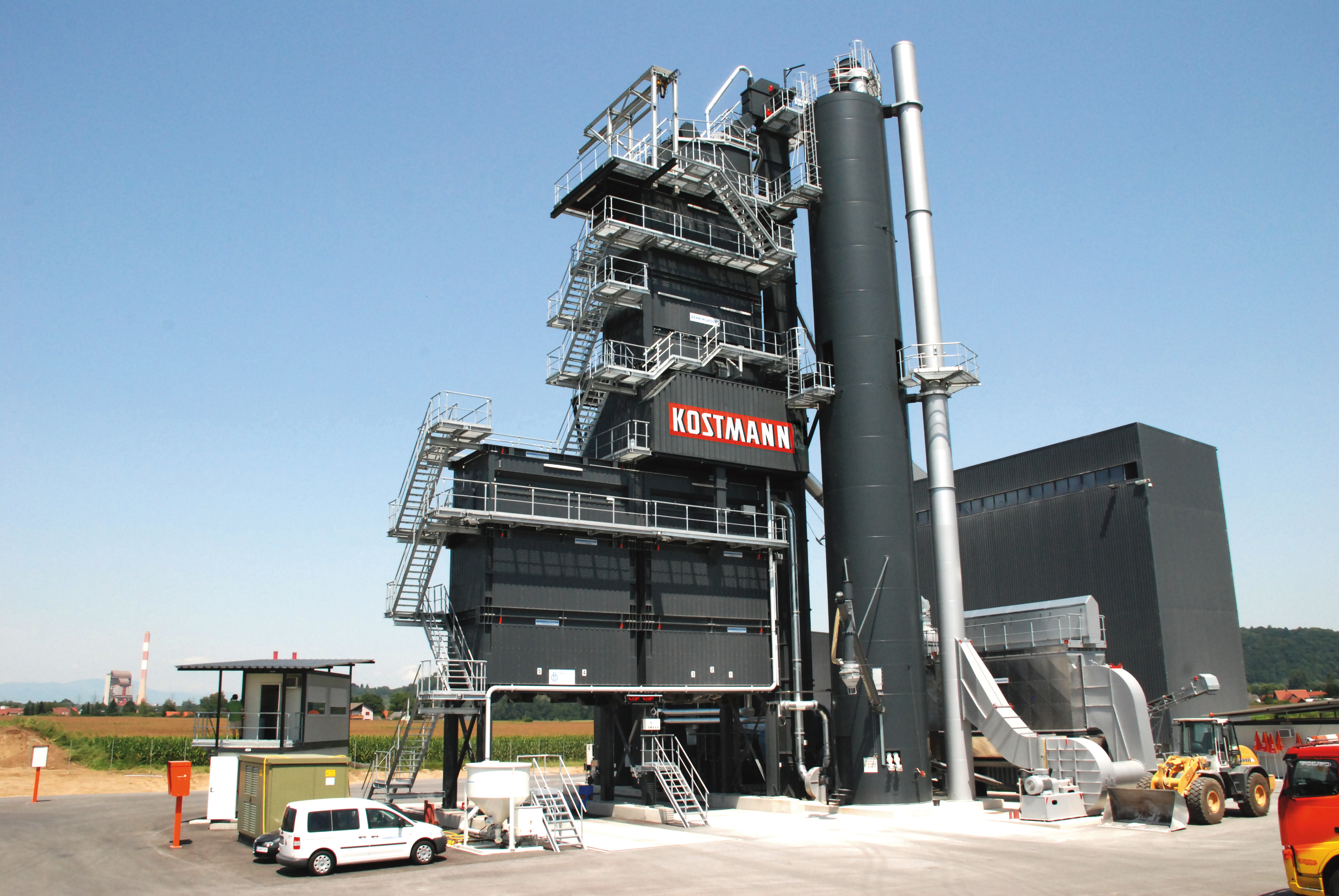
Kostmann’s new Benninghoven asphalt mixing plant, which includes a stone tower silo system, is said to be among the most modern in Europe
In 2012 167 Benninghoven were commissioned by Kostmann, an Austria-based consortium of companies involved in the production and refinement of raw materials, to build an asphalt mixing plant that included a stone tower silo system. The plant - TBA-3000-U –was to be sited at Weitendorf, a location offering good access to the motorway, the Styria regional capital, Graz, and the Austria-Slovenia border.
However, the close proximity of agricultural land and private residential areas called for an adherence to strict emissions requirements.
Kostmann were said to have recognised the value of investing in a long-term site in the Styria region, and in using modern technology to produce asphalt in an efficient and environmentally-friendly way.
Benninghoven said a high level of commitment to the project by all stakeholders including Kostmann made it possible to produce saleable asphalt within the agreed deadline.
The final version of the plant is a complete tailor-made asphalt production system that matches the customer’s vision. At the same time, the characteristics of the finished plant are said to make it one of the most modern in Europe.
Onsite plant supply logistics are described by Benninghoven as remarkable. The bulk material is not delivered via loaders and belt feeders as it is usually in many other systems. The delivering trucks tip the material into a underground bunker system. From this starting point, the material is conveyed to the top of the silo by 40kW-plus powered elevators manufactured by6933 FAF Falkensee. From there, the material is delivered to individual silos according to the aggregate size.
Overall the high silo system stores 2400m³ of material, this provides a solid base for current and future asphalt production requirements.
Benninghoven claims that due to the dry storage of the aggregates, fuel costs can be drastically reduced and the CO2 emissions greatly minimised through the use of the TBA-3000-U. This contribution to the environment is said by Benninghoven to be rarely seen in Europe, and again demonstrates the pioneering investment undertaken by Kostmann.
With up to 800mm-wide conveyor belts, the material is fed to the dryer drum, which, in turn, benefits from environmentally-friendly natural gas-powered combustion technology and appropriate Benninghoven filtration systems.
A six-deck-screen grading process is said to ensure precise aggregate sizes and a perfect mixing operation.
The hot mineral hoppers are filled via the built in diverter chute and contain the material for subsequent dosing into the mineral weigh hopper of the plant. Highest material quality is produced in the twin shaft paddle mixer. All kinds of special asphalts can be manufactured by the modern plant.
The Benninghoven control station BLS 3000 is another feature of the Kostmann-commissioned plant, and is said to prove that extreme performance and high operating comfort are not mutually exclusive.
The TBA-3000-U’s production system allows the admission of over 40% recycled asphalt to be added to the asphalt mix, observed by Benninghoven to make it just one of five asphalt plants in Europe able to achieve this ratio.
In addition, cellulose pellets can be added to the production for special asphalts such as Split Mastic.
The plant’s high efficiency bitumen storage tanks incorporate the latest technology, offering potentially enormous electrical energy savings.
All the TBA-3000-U’s drives from 15kW are fitted with soft starters to ensure efficient electrical operation of the plant, while the larger motors are equipped with a frequency converter. Benninghoven says both installations will effectively save energy because only the required amount is consumed.
In order to get a perfect production plan and transparent cost structure for the plant, the TBA-3000-U is equipped with an advanced control system. This meets the needs of clients for investment management, planning and construction assignments.
It is also said to further fulfil the most stringent customer-requested requirements concerning WBK (factory operational control) and BDE (data collection).
However, the close proximity of agricultural land and private residential areas called for an adherence to strict emissions requirements.
Kostmann were said to have recognised the value of investing in a long-term site in the Styria region, and in using modern technology to produce asphalt in an efficient and environmentally-friendly way.
Benninghoven said a high level of commitment to the project by all stakeholders including Kostmann made it possible to produce saleable asphalt within the agreed deadline.
The final version of the plant is a complete tailor-made asphalt production system that matches the customer’s vision. At the same time, the characteristics of the finished plant are said to make it one of the most modern in Europe.
Onsite plant supply logistics are described by Benninghoven as remarkable. The bulk material is not delivered via loaders and belt feeders as it is usually in many other systems. The delivering trucks tip the material into a underground bunker system. From this starting point, the material is conveyed to the top of the silo by 40kW-plus powered elevators manufactured by
Overall the high silo system stores 2400m³ of material, this provides a solid base for current and future asphalt production requirements.
Benninghoven claims that due to the dry storage of the aggregates, fuel costs can be drastically reduced and the CO2 emissions greatly minimised through the use of the TBA-3000-U. This contribution to the environment is said by Benninghoven to be rarely seen in Europe, and again demonstrates the pioneering investment undertaken by Kostmann.
With up to 800mm-wide conveyor belts, the material is fed to the dryer drum, which, in turn, benefits from environmentally-friendly natural gas-powered combustion technology and appropriate Benninghoven filtration systems.
A six-deck-screen grading process is said to ensure precise aggregate sizes and a perfect mixing operation.
The hot mineral hoppers are filled via the built in diverter chute and contain the material for subsequent dosing into the mineral weigh hopper of the plant. Highest material quality is produced in the twin shaft paddle mixer. All kinds of special asphalts can be manufactured by the modern plant.
The Benninghoven control station BLS 3000 is another feature of the Kostmann-commissioned plant, and is said to prove that extreme performance and high operating comfort are not mutually exclusive.
The TBA-3000-U’s production system allows the admission of over 40% recycled asphalt to be added to the asphalt mix, observed by Benninghoven to make it just one of five asphalt plants in Europe able to achieve this ratio.
In addition, cellulose pellets can be added to the production for special asphalts such as Split Mastic.
The plant’s high efficiency bitumen storage tanks incorporate the latest technology, offering potentially enormous electrical energy savings.
All the TBA-3000-U’s drives from 15kW are fitted with soft starters to ensure efficient electrical operation of the plant, while the larger motors are equipped with a frequency converter. Benninghoven says both installations will effectively save energy because only the required amount is consumed.
In order to get a perfect production plan and transparent cost structure for the plant, the TBA-3000-U is equipped with an advanced control system. This meets the needs of clients for investment management, planning and construction assignments.
It is also said to further fulfil the most stringent customer-requested requirements concerning WBK (factory operational control) and BDE (data collection).

